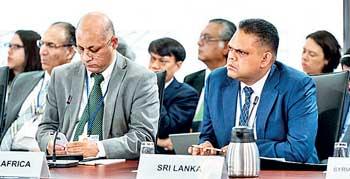18 Apr 2024 - {{hitsCtrl.values.hits}}
 After years of grappling with economic challenges on the international stage, Sri Lanka is now showcasing its rapid recovery efforts this year.
After years of grappling with economic challenges on the international stage, Sri Lanka is now showcasing its rapid recovery efforts this year.
At the G-24 Finance Ministers and Central Bank Governors’ meeting during the IMF/WB Spring Meetings in Washington, Sri Lanka was able to tell an audience comprising of top delegates that progress has been achieved.
According to Finance State Minister Shehan Semasinghe’s update on social media platform X, the key message communicated at the meeting was that the Sri Lankan economy has now stabilised and the growth momentum has commenced.
However, Sri Lanka has expressed that it is looking for support as the economy has more to achieve in its recovery efforts.
“We seek the continued support of our multilateral and bilateral partners for us to meet the formidable challenges successfully and we must come together to share insights, strategies and best practices to navigate these turbulent times and build a more resilient and sustainable future,” he said.
At the deliberations, Sri Lanka highlighted the “deep and wide-ranging” economic reform programme adopted to address fundamental macroeconomic vulnerabilities that contributed to the economic crisis, including significant fiscal reforms, monetary policy adjustment, financial sector stabilisation, debt restructuring, welfare reforms and governance reforms along with progress on the debt restructuring process.
Semasinghe noted that whilst the measures to stabilise the economy have been successful, it was communicated that the government is now in the process of shifting the economy to a new growth path, which is led by non-debt creating inflows, including exports of goods, exports of services and foreign direct investment.
Sri Lanka also took part at the Bio-Diversity Financing Forum held at the world Bank, where the island nation stressed on its priorities and the way forward in accordance to the Climate Prosperity Plan (CPP) launched at the COP 27.
The CPP is a roadmap to attract foreign investment for boosting economic growth and employment generation of Sri Lanka, while accelerating climate adaptation and bringing down the country’s greenhouse gas emissions as it transitions towards net negative emissions.
At the forum, Semasinghe highlighted that Sri Lanka has also set a target for increasing the country’s renewable energy generation from 35 percent to 70 percent by 2030 and that the transport, forestry, water and tourism sectors have similarly ambitious aims.
“Therefore, the country’s plan provides a pathway for Sri Lanka to become a carbon negative economy before the mid of this century. Further noted that Sri Lanka has already initiated work on drafting a Marine Spatial Plan for which the work is already under way,” he said in his update.
29 Nov 2024 19 minute ago
29 Nov 2024 31 minute ago
29 Nov 2024 1 hours ago
29 Nov 2024 2 hours ago
29 Nov 2024 3 hours ago